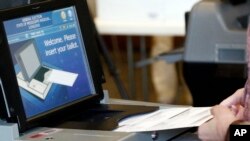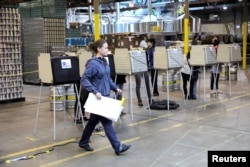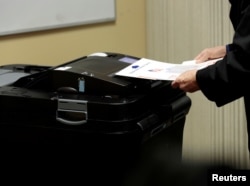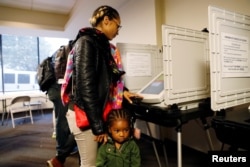As Americans took to the polls on Tuesday, social media trolls targeted U.S. voters with a fresh bout of misinformation, but there were no signs of any foreign cyberattacks on critical election systems.
Several hours before polls closed, Homeland Security Secretary Kirstjen Nielsen cautioned that the Russians "have a full court press through many means."
But officials insisted that two years of preparations were paying off as intrusion sensors had found no evidence of hacked systems.
There were "no tiebacks to any foreign actors that we've seen," said Chris Krebs, undersecretary for the Department of Homeland Security's protection directorate.
Some voters had been exposed to misinformation, officials said, though many of the problems identified on Election Day appeared to be accidental, such as get-out-the-vote efforts mistakenly texting voters to go to the polls "tomorrow."
Social media action
Social media companies acted swiftly to take down what appeared to be deliberate misinformation, he said. Several incidents were referred to law enforcement for investigation.
As the vote proceeded, equipment breakdowns in Georgia, South Carolina, Florida, Pennsylvania, North Carolina, Virginia and Illinois contributed to long lines and voter confusion, Karen Hobert Flynn, president of Common Cause, said.
"Technology is old in many cases, so we're seeing breakdowns," said Hobert Flynn, whose nonpartisan organization deployed 6,500 election monitors across the country.
Nearly 100 million Americans were expected to take to the polls in an election that was widely seen as a referendum on the presidency of Donald Trump. A record 36 million Americans cast their ballots during early voting.
Across New York City, reports of broken ballot scanners surfaced at several polling places, the Associated Press reported.
Turnout was so heavy at one packed precinct on Manhattan's Upper West Side that the line to scan ballots stretched around a junior high school gym. Poll workers there told voters that two of the roughly half-dozen scanners were malfunctioning and repairs were underway.
Voters arriving at two separate polling stations discovered that most scanners had broken down, forcing some people to drop their ballots in "emergency ballot boxes" or vote using an affidavit ballot.
"There are broken scanners everywhere in Brooklyn," Stefan Ringel, spokesman for Brooklyn Borough President Eric Adams, told AP.
Elsewhere, polling place confusion caused problems for voters and poll workers.
In Phoenix, a polling site was foreclosed on overnight. The owners of the property locked the doors, taking election officials by surprise. Voters had been sent to another precinct nearby, but Maricopa County Recorder Adrian Fontes tweeted that the location in Chandler was up and running shortly after 7 a.m. Tuesday.
For about an hour after polls opened Tuesday morning, a Sarasota County, Fla., precinct had to tell voters to come back later because their ballots were not available.
In one Indiana county, voting was snarled for hours because of what election officials said were computer problems related to checking in voters, while in a northwestern county a judge ordered 12 polling places to stay open late because voting didn't start as scheduled.
In Texas, home of a hotly contested U.S. Senate race, delays were reported in Houston after apparent issues with registration check-in machines at some polling places.
And in El Paso, the U.S. Border Patrol canceled a "crowd control exercise" that was scheduled for Tuesday, following criticism from civil liberties groups that it could dissuade people from voting.
Cause for concern
The potential for malfunctioning voting machines has long been a source of concern.
Forty-three states use voting machines that are no longer made, according to the nonpartisan Brennan Center for Justice. And five states — Delaware, Georgia, Louisiana, New Jersey and South Carolina — rely exclusively on touchscreen systems that produce no paper trail; eight other states use such systems, but only in some jurisdictions.
Nine states with toss-up or competitive House, Senate or gubernatorial races use paperless voting machines, according to the Brennan Center. Those states include Georgia, where Democrat Stacey Abrams was running to be the country's first black female governor.
In the lead-up to Tuesday's vote, there were persistent worries that U.S. adversaries might attempt to disrupt the election in a reprise of Moscow's interference in the 2016 U.S. presidential vote. As early as August, Director of National Intelligence Dan Coats warned that the threat of Russian interference was "real" and "continuing."
U.S. agencies logged about 160 reports of suspected foreign interference in recent months, and social media networks have taken down hundreds of suspicious accounts.
But the incidents have not risen to the level of two years ago, when Kremlin-linked cyber actors targeted the election systems of at least 21 U.S. states and orchestrated one of the largest influence operations in history to try to shape the outcome, intelligence agencies found, in favor of Trump.
Security to local officials
In the country's highly decentralized election system, virtually all elections are administered by state and local governments. But in the two years since the Russian attack, states have worked closely with the Department of Homeland Security, the FBI, the office of the director of national intelligence and other agencies to boost cyber defenses.
Homeland Security studied potential threats in 21 states, and sensors to detect computer break-ins were put in place.
"At this time we have no indication of compromise of our nation's election infrastructure that would prevent voting, change vote counts or disrupt the ability to tally votes," DNI Director Coats, FBI Director Christopher Wray, Attorney General Jeff Sessions and Homeland Security Secretary Nielsen said in a joint statement released late Monday.
Still, the officials warned that "Americans should be aware that foreign actors — and Russia in particular — continue to influence public sentiment and voter perceptions.”
Although potential foreign interference has drawn the most attention, allegations of voter suppression and potential voter fraud emerged as partisan issues in what is a recurring controversy in U.S. elections.
National Security Correspondent Jeff Seldin contributed to this report. Some material for this report came from The Associated Press.








